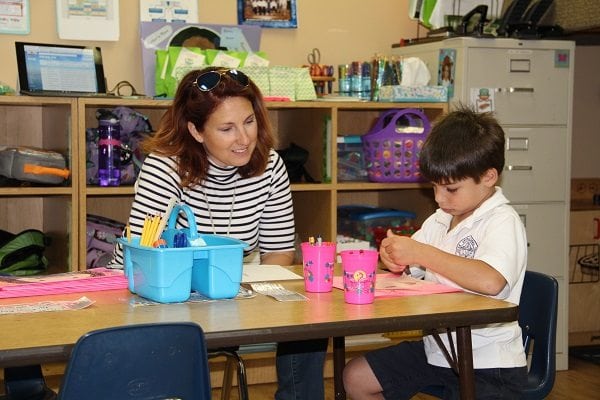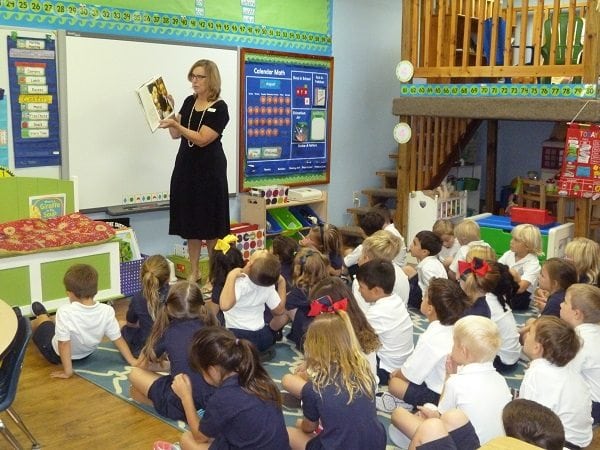
What does it mean to be gifted? There’s often a misconception about the label. By definition, gifted does not mean “easy to teach.” Students who are gifted may struggle in certain areas of school and excel in others. They might not even be “A” students. It does mean that a student has an advanced capacity to learn and apply knowledge in a particular area, whether it’s academic, artistic, athletic or social.
“We encourage our students to pursue their passions,” explains Caitlin O’Keefe, Director of Education and Curriculum. “All of our students have gifts, and our purpose at SJEDS is to help each child develop their talents.”
San Jose Episcopal Day School has been on a journey to provide an exceptional academic experience through differentiated instruction. In recent years, 11 faculty members at San Jose Episcopal Day School completed the coursework and training required to receive their gifted endorsement as an additional enhancement to their teaching certificate.
As Head of School, Lori Menger began a professional development initiative to provide faculty with hands-on training in differentiated instruction. For three years, SJEDS faculty worked with Dr. Christine Weber, Associate Professor of Childhood at the University of North Florida, an expert in differentiation and gifted instruction. The faculty have continued their gifted education professional development through The Schultz Center, completing five courses on their own time, as a cost-effective way of providing high-quality training.
“It really goes back to our Episcopal identity,” Menger says. “We see each student as a unique individual created by God, and it’s our job to tap into their natural gifts and talents. We are providing our teachers with the tools they need to do that.”
Kindergarten teacher Kathy Balek, who received her gifted endorsement in 2014, points out an example of how differentiated learning has benefitted her students.
“I had a student who, during the first few weeks of school, demonstrated that he had already mastered kindergarten math skills,” she recalls. “Because I have the autonomy to tailor instruction in my classroom for each individual student, we spent his kindergarten year successfully working through the first grade math curriculum. With differentiation, our classrooms have no ceilings; we can take learning as high as we can go.”
Differentiation training led way to focusing on gifted endorsement. “It was really the next natural step to further our commitment to our students,” adds Menger. “We want our students to be lifelong learners, and we feel it’s important to model that through our own professional growth.”
For teachers, this opens a new perspective on differentiated instruction by helping them to better identify gifted students, structure curriculum specifically for these students and provide enrichment in areas that provide a deeper understanding of concepts.

“Gifted does not mean good or better,” states first-grade teacher Allison Weaver. “I was fascinated by the use of the term ‘underachievers.’ These students are highly capable, but struggle to complete assignments or seem disinterested in school. Therefore, their giftedness goes unnoticed and unidentified. As a classroom teacher, it is crucial I do whatever it takes to keep these students engaged and challenged throughout the day.”
In her studies, Weaver learned how changes to the regular curriculum ensure these children are challenged and engaged throughout the day. She also stressed the importance of building relationships with her students, which enables her to better identify their strengths and in turn, make her classroom a fun and exciting place.
The training also provided insight into the importance of creativity. Creative giftedness, which can often be overlooked, is just as powerful academic giftedness. Creativity can manifest itself in talent such as performing or fine arts, or in creative thought such as humor.
“There are comedians in our society making millions of dollars. Look at Jimmy Fallon,” points out Menger. “People with that kind of gift might not have been the best math student or had the best science fair project, but there’s value in what they do.”
Creativity is an important tool for teachers as well. “As teachers, we can’t let it go by the wayside. The more creativity we use in class, the more the students will get out of it,” explains language arts teacher Shannon Nunley. “For my sixth graders, I encourage our discussions to go outside of the box so that students really explore the answers and understand the material. I learned that taking time for the creative process is more important than checking the box and moving on to the next thing on my lesson plan.”
The foundation of the coursework focused on the nature and identification of gifted students, understanding different learning styles and how to cater to their needs.
“Sometimes gifted students are hard to spot,” Nunley explains. “They might be the one struggling in class simply because they’re disinterested. I learned that gifted students thrive on choices, and by simply giving students choices on their assignments, it enables them to stay interested. The more interested they are in a topic, the more effort they put forth and ultimately the more enjoyment they get out of learning.”
Choices translate to different learning styles as well. As Weaver explains, “Instead of giving the students one specific way to solve a problem or complete a task, I give them options and encourage inquiry and creativity to develop problem solving skills. Knowing this has enabled me to challenge the gifted students in my classroom.”
Menger adds that the end goal is to help all of their students reach their fullest potential.
“As a teacher, it is fulfilling to empower kids and help light that lifelong spark,” she says. “All that we’re doing, through differentiation and Think Tank, our school-wide enrichment program, provides real, authentic learning experiences. And that sticks with kids better than multiple choice tests.”
San Jose Episcopal Day School is a private school for pre-K 3 through 6th grade, located at 7423 San Jose Blvd. in Jacksonville. For more information, visit sjeds.org or call (904) 733-0352.
















